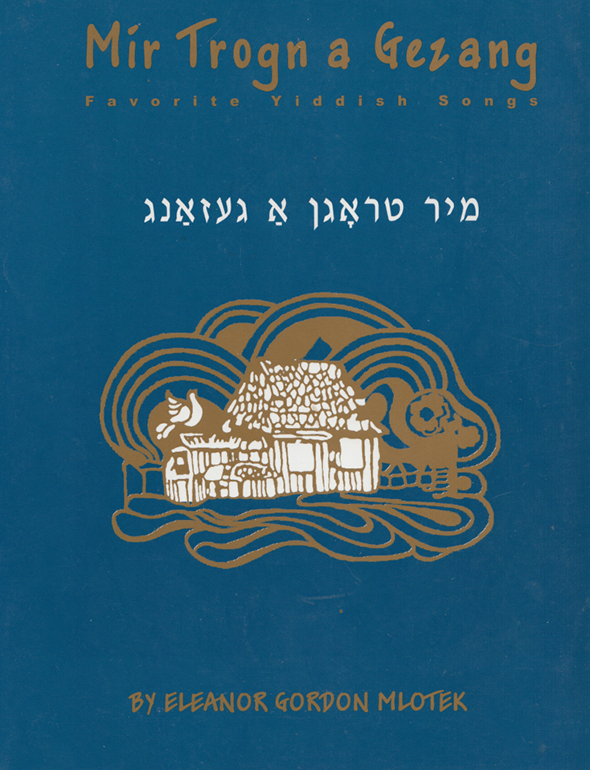This song (text by J. Leiserowitz, music, A. Schwartz) was one of the most popular songs of immigrant life in America. This version was published by Chana Mlotek in 1954.

A cousin came to me.
She was beautiful as gold, the greenhorn.
Her cheeks were like red oranges,
and her legs were begging for a dance.
She didn’t walk, she pranced,
she didn’t talk, she sang;
Her manner was joyful and merry.
That is just what she was like.
I went in to my next-door neighbor
who had a little millinary shop,
I got my cousin a job–
Hurrah for the golden land!
Since then, years have passed.
and my cousin has become a wreck;
She has had long years of “paydays,”
until there is nothing left of her.
Beneath her pretty blue eyes
black lines have spread;
her cheeks, those red oranges
have turned green* with age.
Now, when I meet my cousin
and I ask her, “How are you, my green one?”
she answers me with a sour face:
“To hell with Columbus’ country!”
*Oysgegrint- a pun on “Americanized”
Es iz tsu mir gekumen a kuzine
Sheyn vi gold iz zi geven, di grine,
Di bekelekh vi royte pomerantsn,
Fiselekh vos betn zikh tsum tantsn.
Nit gegangen iz zi — nor geshprungen,
Nit geredt hot zi, nor gezungen;
Freylekh, lustik iz geven ir mine.
Ot aza geven iz mayn kuzine.
lkh bin arayn tsu mayn “nekst-dorke”
Vos zi hot a “milineri-storke”,
A “dzhab” gekrogn hob ikh far mayn kuzine —
Az lebn zol di goldene medine!
Avek zaynen fun demolt on shoyn yorn,
Fun mayn kuzine iz a tel gevorn;
“Peydes” yorn lang hot zi geklibn,
Biz fun ir aleyn iz nisht geblibn.
Unter ire bloye sheyne oygn
Shvartse pasn hobn zikh fartsoygn;
Di bekelekh, di royte pomerantsn,
Hobn zikh shoyn oysgegrint in gantsn.
Haynt, az ikh bagegn mayn kuzine
Un ikh freg zi: Vos zhe makhstu, grine?
Entfert zi mir mit a krumer mine:
— Az brenen zol Kolombuses medine!
עס איז צו מיר געקומען א קוזינע
שײן װי גאָלד איז זי געװען, די גרינע,
די בעקעלעך װי רױטע פּאָמעראַנצן,
פֿיסעלעך װאָס בעטן זיך צום טאַנצן.
ניט געגאַנגען איז זי — נאָר געשפּרונגען,
ניט גערעדט האָט זי, נאָר געזונגען,
פֿרײלעך, לוסטיק איז געװען איר מינע,
אָט אַזאַ געװען איז מײַן קוזינע.
איך בין אַרײַן צו מײַן „נעקסט-דאָרקע”
װאָס זי האָט א „מילינערי-סטאָרקע”,
א „דזשאַב” געקראָגן האָב איך פֿאַר מײַן קוזינע,
אַז לעבן זאָל די גאַלדענע מדינה!
אַװעק זײַנען פֿון דעמאָלט אָן שױן יאָרן,
פֿון מײַן קוזינע איז א תּל געװאָרן,
„פּײדעס” יאָרן לאַנג האָט זי געקליבן,
ביז פֿון איר אלײן איז נישט געבליבן.
אונטער אירע בלױע שײנע אױגן
שװאַרצע פּאַסן האָבן זיך פֿאַרצױגן,
די בעקעלעך, די רױטע פּאַמעראַנצן,
האָבן זיך שױן אױסגעגרינט אין גאַנצן.
הײַנט, אַז איך באַגעגן מײַן קוזינעץ
און איך פֿרעג זי: — װאָס זשע מאַכסטו, גרינע?
ענטפֿערט זי מיר מיט אַ קרומער מינע:
— אַז ברענען זאָל קאַלאַמבוסעס מדינה!
Song Title: Di Grine Kuzine

First published in 1972, Mir Trogn A Gezang: Favorite Yiddish Songs was reprinted six more times (in 1977, 1982, 1985, 1987, 1988, 2000) due to popular demand. The songs in this anthology represent a sampling of beloved folk and well-known Yiddish songs, many of which are scattered in various song collections; some appear in very rare and inaccessible collections; and some were never before published. Folk songs comprise about a third of this volume and were selected mainly on the basis of popularity and sometimes for their historic significance. Needless to say, they are only representative of the vast, rich treasure of Yiddish folk material. The selection was made not only on the basis of personal preference, but in the knowledge they are favorites of many who sing these songs. Most of the songs represent the repertoire that was sung at Yiddish summer camps, May 1st demonstrations and at social gatherings. Many songs were introduced to American Jewry by Jewish immigrants who came to the United States after World War II, for whom these songs had been favorites in Poland and other East European communities destroyed by the Nazis.